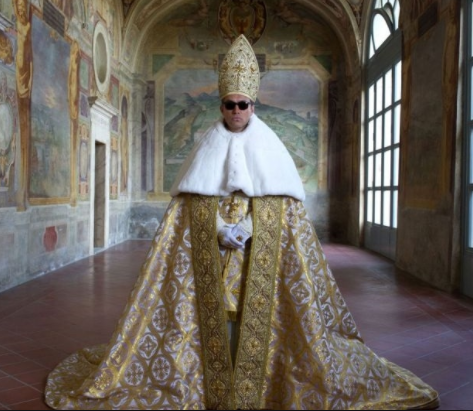“Fanaticism is love. Anything else is just a surrogate.” So asserts Lenny Belardo a.k.a. Pope Pius XIII (Jude Law) to his constituency of cardinals as he finally feels ready to consort with and address them upon the arrival of the papal crown from the Smithsonian. After all, a return to the tyrannical conservatism of the Vatican’s early days wouldn’t be complete without the papal crown. Prior to this moment, upon declaring, “Tolerance doesn’t live here anymore. It’s been evicted. It vacated the house for the new tenant, who has diametrically opposite tastes in decorating,” Pius XIII remained largely silent–much to the dismay of Cardinal Secretary of State Angelo Voiello (Silvio Orlando).
Voiello, who admits that the pope’s election was meant to be a compromise between choosing someone overly radical and overly trapped in the past, comes to blows with Pius many times throughout The Young Pope, Paolo Sorrentino’s second foray into an HBO series after Gomorrah. Eventually, however, he becomes his most loyal follower, convinced Pius is an actual saint. This puts him in something of the Steve Bannon role, as assistant and chief strategist to the pope–though let us not forget Sister Mary (Diane Keaton). At the outset of her arrival to the Vatican, of which she states, “I read somewhere that Rome is a suburb of Vatican City,” most of the cardinals speculate that she is the one controlling the puppet strings that determine what Pius will do next. Their history together would suggest that Sister Mary does have more than a little clout with little Lenny, as she still sees him. After all, she was the one who watched over him when he was first brought to her orphanage in New York. And yes, it is this piece of Lenny’s history–being an orphan–that colors his entire existence. His lack of parents and inability to have children of his own due to his “marriage to god,” makes him something of a perma-child. Trump, on the other hand, doesn’t really have such a tragic history to “explain away” or “justify” his own erratic and irascible behavior.
Even so, one can’t help but draw comparisons to the two when it comes to their child-like nature, inexperience and general unpleasantness when it comes to interacting with anyone in their midst. In “First Episode,” Lenny’s demand for a Cherry Coke Zero before he can commence with his day–during which he seems to do very little–conjures an immediate image of Trump’s own cantankerously unpredictable actions from inside the White House.
As Voiello becomes increasingly concerned with Pius’ lack of concern over what the Church’s followers and statesmen alike will think of his reclusive behavior, the pope balks, “I don’t put stock in consensus.” Clearly, neither does Trump. And though Sorrentino imbues his anti-hero with intermittent moments of humanity and, dare one say it, likability (e.g. calling on a miracle from God to give a barren woman a child), these instances are too often too few and far between to ignore the very real fact that Pius is a homophobe with antiquated views on reproductive rights. His insistence that “abortion is saying no to life” is met with a mocking response from his mentor/the man he ousted from the position of pope (he’s sort of like a Jeb Bush figure), Cardinal Spencer (James Cromwell), who returns, “Who gives a damn about life? Life is not some stupid centerpiece on the side table of nothingness. Life is to be used and used well. To love and be loved.”
But Pius’ staunch coldness when it comes to interpreting the Bible quite literally cannot be argued against, even by those closest to him. Still, they try, with the likes of his press secretary, Sofia (Cécile De France)–think Kellyanne Conway but with intelligence–urging him to throw the followers of the Catholic Church some kind of a bone by making an appearance, even if it’s in the far reaches of an African village. Or Monsignor Bernardo Gutierrez (Javier Cámara), ultimately asked by Pius to be his new advisor, but then refuses after saying it would be hypocritical as he himself is a homosexual who can’t agree with the outmoded policies of the pope.
In “Ninth Episode,” as Cardinal Spencer is on his deathbed, he takes on a more Obama leaving the throne vibe, warning, “You’re spreading a sorrow even you don’t understand. And that’s the worst thing a human being can do.” Pius remains unmoved by this accusation, not willing to show emotion until admitting to Spencer that he does believe in God (though he’s stated many times throughout the series that he does not). Spencer then concludes, “You think you’re the hinge, but you’re the door.” Sadly, when a man like Lenny Belardo or Donald Trump thinks he’s the hinge, there can be no stopping him as he slams every door to progress shut. But at least Lenny Belardo is pleasant to look at as he severs your fingers in the diminishing space of the door.





















